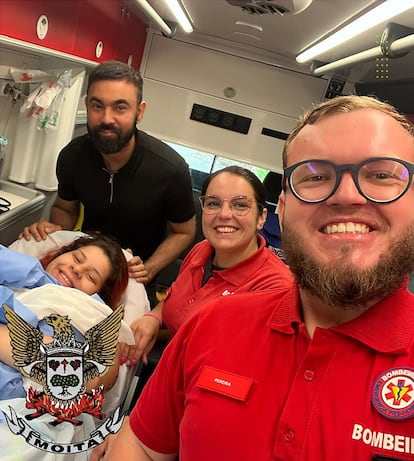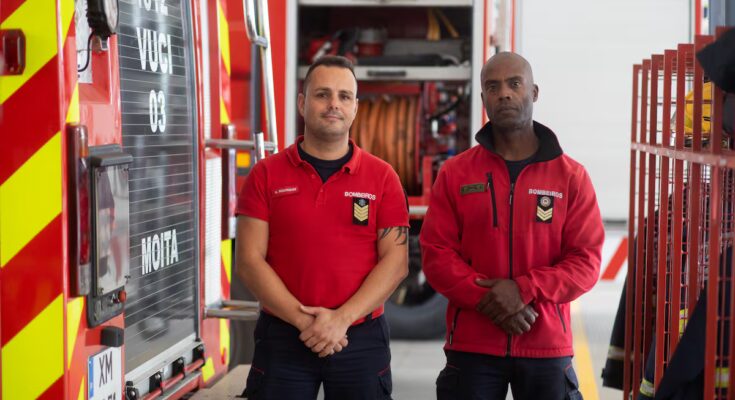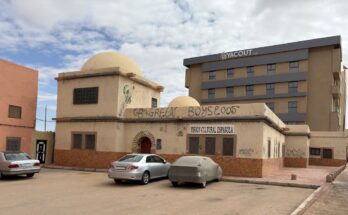Neither Paulo Medina nor Hugo Rodrigues became firefighters because of this. What firefighters like Medina and Rodrigues want to do is put out fires. What they increasingly do is handle ambulance deliveries. “Life doesn’t wait”, repeats like a mantra Pedro Ferreira, the commander of the fire brigade of Moita, about 40 kilometers from Lisbon. The births that took place on ambulance stretchers in the town of 70,000 people, on the southern shore of the Tagus estuary, ended up in lively photos on Facebook, but Commander Ferreira wonders what will happen the day a birth goes wrong and there is nothing left to celebrate.
In his office at the barracks where he organizes the work of Moita’s 61 volunteer firefighters, he himself gives the answer:
—The day something bad happens and a child dies, we will be on them. That day I don’t want my men to go on television, that day I will be there to show my face. Never in the history of Portugal have firefighters attended so many births. This year we have 15, but that’s a record I don’t want. The place to be born is a maternity hospital.
What is happening is unusual, but logical. The firefighters, responsible for medical transport, never close, while the Gynecology and Obstetrics emergency rooms of some Portuguese hospitals do so frequently. Although Moita’s pregnant women have a hospital in Barreiro, 10 minutes away, the maternity hospital closes from time to time. “It closes almost every weekend, sometimes for several days,” explains the commander. Nor do other nearby hospitals guarantee assistance and suddenly suspend admissions. “At 3.05am this morning I received an email from Almada hospital (half an hour away) informing them that they would be closing the delivery block until 8.30am. This is archaic,” he laments.
Thus volunteer firefighters, who depend on local foundations and work in precarious conditions, become midwives against their will. The last baby to come into the world was born on October 6 in a service area on the A33 motorway, while the ambulance was trying unsuccessfully to reach the hospital in Setúbal. Firefighters receive better training than a salary: they have no additional risk in risking their lives in fires, but they are trained for medical emergencies. Among the ambulance materials there is that which is essential for welcoming a child. In Moita vehicles these are replaced kit pediatrics at a faster rate than anywhere else in the country.
The increase in ambulance births (35 this year, around 22% of those recorded outside the hospital) symbolizes the deterioration of public health. When the country requested a financial bailout from international organizations, the cuts undermined a system that had been one of its patriotic prides. Although they have partially reversed since 2015, nothing has been the same as before. And the overload of the pandemic has put the National Health Service to the test. The lack of healthcare workers, who receive a better life and a better salary in the private sector, is a problem that has existed since the times of the socialist governments of António Costa and which continues with Luís Montenegro’s team. Every day someone calls for the head of the Minister of Health, Ana Paula Martins, who these days is criticized for the death of a 36-year-old pregnant woman with heart problems and her baby born by caesarean section.

The 15 births assisted by the Moita firefighters had a happy ending. It always generates a certain feeling of joy for Hugo Rodrigues. “You feel a mix of emotions, it’s a very special and meaningful event to help someone come into the world,” he describes. They all went well, although in one of them everything went wrong. “We arrived and found the woman in labor on the floor, with her husband passed out next to her. They were at the door of the house and it was raining. A baby came out and suddenly we see that there is a second that no one knew about. She was in cardiopulmonary arrest and luckily we managed to reverse the situation. It was the most complicated of the seven or eight births I have witnessed in recent years,” she says.
One day the minister’s cabinet called to ask why so many babies were being born in the Moita fire department’s ambulances. For Commander Ferreira, the first reason is that women giving birth are forced to go to distant hospitals, which increases the probability of not arriving in time. The second is the demographic profile of the population, where numerous immigrants reside who sometimes do not receive follow-up during pregnancy and wait until the end to ask for assistance. Or even that they didn’t find out about their pregnancy. “One of the cases this year was that of a Guinean woman who called because she had abdominal pain and when we arrived we discovered that it was a pregnancy that she was not aware of. There was not even an ultrasound that allowed us to see the position of the baby,” recalls the fire chief.
Paulo Medina, who has had the experience three times, has just arrived from a medical transport service when he sums up the contradiction with which he and his colleagues deal with births: “It makes me happy to know that I have given birth to three children, but it is one of those things I prefer to let go of. At that moment we have two lives in our hands. If things go badly in hospitals, inside an ambulance you do everything to make things worse.”



